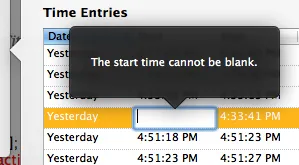有没有办法让NSNumberFormatter(或者可能是任何其他NSFormatter)在NSPopover中工作?
在popover中,NSTextField的值与NSViewController的representedObject绑定。当无效数字输入到字段中时(例如,“asdf”)会出现一个Sheet,显示该值无效,并呈现在包含弹出窗口的NSView所在的NSWindow中。
一旦你点击“确定”,就会得到以下回溯:
* thread #1: tid = 0x4e666a, 0x00007fff931f9097 libobjc.A.dylib`objc_msgSend + 23, queue = 'com.apple.main-thread', stop reason = EXC_BAD_ACCESS (code=EXC_I386_GPFLT)
frame #0: 0x00007fff931f9097 libobjc.A.dylib`objc_msgSend + 23
frame #1: 0x00007fff8a1fa6c8 AppKit`-[NSTextView(NSSharing) becomeKeyWindow] + 106
frame #2: 0x00007fff8a080941 AppKit`-[NSWindow(NSWindow_Theme) acquireKeyAppearance] + 207
frame #3: 0x00007fff8a0800df AppKit`-[NSWindow becomeKeyWindow] + 1420
frame #4: 0x00007fff8a07f5c6 AppKit`-[NSWindow _changeKeyAndMainLimitedOK:] + 803
frame #5: 0x00007fff8a1a205d AppKit`-[NSWindow _orderOutAndCalcKeyWithCounter:stillVisible:docWindow:] + 1156
frame #6: 0x00007fff8a0876c5 AppKit`-[NSWindow _reallyDoOrderWindow:relativeTo:findKey:forCounter:force:isModal:] + 3123
frame #7: 0x00007fff8a0867f0 AppKit`-[NSWindow _doOrderWindow:relativeTo:findKey:forCounter:force:isModal:] + 786
frame #8: 0x00007fff8a086470 AppKit`-[NSWindow orderWindow:relativeTo:] + 162
frame #9: 0x00007fff8a1a1425 AppKit`__18-[NSWindow _close]_block_invoke + 443
frame #10: 0x00007fff8a1a1230 AppKit`-[NSWindow _close] + 370
frame #11: 0x00007fff8a2d0565 AppKit`__106-[NSApplication(NSErrorPresentation) presentError:modalForWindow:delegate:didPresentSelector:contextInfo:]_block_invoke3221 + 50
frame #12: 0x00007fff8a2d02f7 AppKit`-[NSApplication(NSErrorPresentation) _something:wasPresentedWithResult:soContinue:] + 18
frame #13: 0x00007fff8a28fe9d AppKit`-[NSAlert didEndAlert:returnCode:contextInfo:] + 90
frame #14: 0x00007fff8a28f8c2 AppKit`-[NSWindow endSheet:returnCode:] + 368
frame #15: 0x00007fff8a28f49d AppKit`-[NSAlert buttonPressed:] + 107
frame #16: 0x00007fff8a1543d0 AppKit`-[NSApplication sendAction:to:from:] + 327
frame #17: 0x00007fff8a15424e AppKit`-[NSControl sendAction:to:] + 86
frame #18: 0x00007fff8a1a0d7d AppKit`-[NSCell _sendActionFrom:] + 128
frame #19: 0x00007fff8a1ba715 AppKit`-[NSCell trackMouse:inRect:ofView:untilMouseUp:] + 2316
frame #20: 0x00007fff8a1b9ae7 AppKit`-[NSButtonCell trackMouse:inRect:ofView:untilMouseUp:] + 487
frame #21: 0x00007fff8a1b91fd AppKit`-[NSControl mouseDown:] + 706
frame #22: 0x00007fff8a13ad08 AppKit`-[NSWindow sendEvent:] + 11296
frame #23: 0x00007fff8a0d9744 AppKit`-[NSApplication sendEvent:] + 2021
frame #24: 0x00007fff89f29a29 AppKit`-[NSApplication run] + 646
frame #25: 0x00007fff89f14803 AppKit`NSApplicationMain + 940
发生objc_msgSend崩溃时的寄存器如下:
(lldb) reg read
General Purpose Registers:
rax = 0x0000610000190740
rbx = 0x0000610000190740
rcx = 0x0000000000000080
rdx = 0x00007fff8a97fd93 "currentEditor"
rdi = 0x0000610000190740
rsi = 0x00007fff8a9612bf "respondsToSelector:"
rbp = 0x00007fff5fbfeae0
rsp = 0x00007fff5fbfeab8
r8 = 0x000000000000002e
r9 = 0xffff9fffffeb1bbf
r10 = 0x00007fff8a9612bf "respondsToSelector:"
r11 = 0xbaddbe5c3e96bead
r12 = 0x0000610000053830
r13 = 0x00007fff931f9080 libobjc.A.dylib`objc_msgSend
r14 = 0x000060000012a500
r15 = 0x00007fff931f9080 libobjc.A.dylib`objc_msgSend
rip = 0x00007fff931f9097 libobjc.A.dylib`objc_msgSend + 23
rflags = 0x0000000000010246
cs = 0x000000000000002b
fs = 0x0000000000000000
gs = 0x00000000c0100000
我猜测这是因为短暂的弹出窗口在显示表单后消失了,所以当前编辑器和任何可以响应选择器的对象都无法使用。
将弹出行为设置为NSPopoverBehaviorSemitransient会有所帮助,但如果文本字段中放入无效值导致弹出窗口被关闭,则仍会抛出异常。
此时,我能想到的避免这个问题的方法就是手动验证数值。很烦人。
更新1
正如Brian Webster在下面发现的那样,这是AppKit的一个根本性问题。
由于我的验证需求非常简单(只需要正整数),所以解决方法是在NSPopover中使用的KVC对象中进行手动验证。由于NSTextField确实想要使用字符串值,所以使用-valueForKey:和-setValue:forKey:来转换标量值。当你为文本字段绑定的值打开“立即验证”时,每次文本字段更改时都会调用验证方法。
(在你问之前,NSValueTransformer不能完成这项工作,因为它不参与验证过程。它只在填充字段或保存更改时被调用。我想要用户输入一些无效数据后立即得到反馈——就像NSFormatter那样。)
以下是我所做的主要内容:
- (id)valueForKey:(NSString *)key
{
if ([key isEqualToString:@"property1"]) {
return [NSString stringWithFormat:@"%zd", _property1];
}
else if ([key isEqualToString:@"property2"]) {
return [NSString stringWithFormat:@"%zd", _property2];
}
else {
return [super valueForKey:key];
}
}
- (BOOL)validateValue:(inout id *)ioValue forKey:(NSString *)inKey error:(out NSError **)outError
{
if (! *ioValue) {
*ioValue = @"0";
}
else if ([*ioValue isKindOfClass:[NSString class]]) {
NSString *inputString = [[(NSString *)*ioValue copy] autorelease];
inputString = [inputString stringByReplacingOccurrencesOfString:@"," withString:@""];
NSInteger integerValue = [inputString integerValue];
if (integerValue < 0) {
integerValue = -integerValue;
}
*ioValue = [NSString stringWithFormat:@"%zd", integerValue];
}
return YES;
}
- (void)setValue:(id)value forKey:(NSString *)key
{
if ([value isKindOfClass:[NSString class]]) {
if ([key isEqualToString:@"property1"]) {
_property1 = [value integerValue];
}
else if ([key isEqualToString:@"property2"]) {
_property2 = [value integerValue];
}
else {
[super setValue:value forKey:key];
}
}
else {
[super setValue:value forKey:key];
}
}
现在我需要洗个澡。
更新2
感谢@PixelCutCompany提供的一些有用提示,关于他们在PaintCode应用程序中如何处理事情:
https://twitter.com/PixelCutCompany/status/441695942774104064 https://twitter.com/PixelCutCompany/status/441696198140125184
我想到了这个:
@interface PopupNumberFormatter : NSNumberFormatter
@end
@implementation PopupNumberFormatter
- (BOOL)getObjectValue:(out id *)anObject forString:(NSString *)aString range:(inout NSRange *)rangep error:(out NSError **)error
{
NSNumber *minimum = [self minimum];
NSNumber *maximum = [self maximum];
if (aString == nil || [aString length] == 0) {
if (minimum) {
*anObject = minimum;
}
else if (maximum) {
*anObject = maximum;
}
else {
*anObject = [NSNumber numberWithInteger:0];
}
}
else {
if (! [super getObjectValue:anObject forString:aString range:rangep error:nil]) {
// if the superclass can't parse the string, assign a reasonable default
if (minimum) {
*anObject = minimum;
}
else if (maximum) {
*anObject = maximum;
}
else {
*anObject = [NSNumber numberWithInteger:0];
}
}
else {
// clamp the parsed value to a minimum and maximum (if set)
if (minimum && [*anObject compare:minimum] == NSOrderedAscending) {
*anObject = minimum;
}
else if (maximum && [*anObject compare:maximum] == NSOrderedDescending) {
*anObject = maximum;
}
}
}
return YES;
}
@end
基本上,您可以通过始终提供有效值来避免表格或对话框中的问题。上述代码在分配默认值时考虑了最小和最大值。子类还考虑了nil或空字符串以及夹紧值。
这让我感觉不那么糟糕了。
